- About Ramapo
- Academics
- Admissions & Aid
- Student Life
- Athletics
- Alumni
- Arts & Community
- Quick Links
- Apply
- Visit
- Give
CHGS Events, 2023-2024
CHGS Events, 2023-2024
Five-Part Online Seminar Series: New Technologies, Antisemitism, and Holocaust Education
All times given in Eastern Standard Time
All events are free and open to the public.
For more information write to holgen@ramapo.edu
Preventing Genocide
Tallan Donine, USHMM
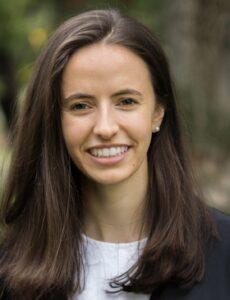 Wednesday, September 6 at 6:30 PM (Zoom only)
Wednesday, September 6 at 6:30 PM (Zoom only)
The United States Holocaust Memorial Museum teaches that the Holocaust was preventable and that by heeding warning signs and taking early action, individuals and governments can save lives. With this knowledge, the Simon-Skjodt Center for the Prevention of Genocide works to do for the victims of genocide today what the world failed to do for the Jews of Europe in the 1930s and 1940s. The mandate of the Simon-Skjodt Center is to alert the United States’ national conscience, influence policy makers, and stimulate worldwide action to prevent and work to halt acts of genocide or related crimes against humanity, and advance justice and accountability. Learn more at ushmm.org/genocide-prevention.
OPEN CLASSROOM SERIES: This program is part of our Open Classroom Series, through which we invite the public into our classrooms to learn from guest lecturers alongside our students. The talk will be delivered in webinar format. While we prioritize our students’ participation, non-student participants may ask questions through the Q&A feature.
Donation Presentation from the Częstochover Society and Relief Committee
Wednesday, September 20 at 2:30 PM (Center, LC-215)
Represented by Lea Wolinetz and Harry Rapaport, the Częstochover Society and Relief Committee will present a significant donation to the Center. With this small ceremony, we mark the beginning of what we know will be a lasting relationship between our two organizations. The Center is honored to help keep the memory of Jewish Częstochowa alive for future generations. This event is free and open to the public. Light refreshments will be served.
The Częstochover Society and Relief Committee was founded in 1914 as a Landsmannschaft (immigrant association) for Jewish immigrants from Częstochowa, Poland in New York City. Its role evolved with the times, particularly after the Holocaust and with the upward mobility and them slow passing of its founding members.
Lea and Harry will return to Ramapo on the evening of October 25th to speak with the campus community and, specifically, with students enrolled in Dr. Labendz’s course, “Paradigms of Genocide.” See below for more information.
Ann Hagedorn, Keynote Address for CONTACT Symposium
Monday, October 9 at 6:00 PM (Hybrid: Friends Hall and Zoom)
Acclaimed author and journalist, Ann Hagedorn, will deliver the keynote address for a scholarly symposium to be held at Ramapo College, October 9 – 11, “CONTACT: The Meeting and Movement of Jewish People and Artifacts across Cold-War Boundaries.”
Ms. Hagedorn will speak about her latest book, Sleeper Agent: The Atomic Spy in America Who Got Away (Simon & Schuster, 2021)
Born in Iowa, schooled in science at Columbia University, and as American as baseball, George Koval was the ultimate secret agent. Because he had security clearances to the Manhattan Project, he was able to pass invaluable classified information that helped Soviet scientists produce an atomic bomb years earlier than US experts had expected. The FBI only identified him several years after he had returned to the Soviet Union, and in 2007, Vladimir Putin posthumously awarded him Russia’s highest civilian honor for his contribution to the Soviet atomic bomb program.
This event is free and open to the public. Light refreshments will be served.
Academic Symposium at the Center
CONTACT: The Movement and Meeting of Jewish People and Artifacts across Cold-War Boundaries
October 9 – 11, 2023
Survivors of the 1994 Genocide against the Tutsi in Rwanda Speak
With Providence Umugwaneza and Erick Nkurunziza
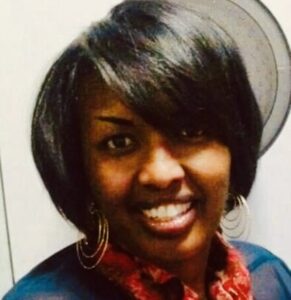 Wednesday, October 11 at 6:30 PM (Zoom only)
Wednesday, October 11 at 6:30 PM (Zoom only)
Providence Umugwaneza and Erick Nkurunziza will speak with Ramapo students about their experiences and those of their relatives during the 1994 Genocide against the Tutsi in Rwanda. To prepare for the discussion, students will read Ms. Umugwaneza’s memoir, Next Couple of Hours (Cider Spoon, 2021). We encourage webinar participants to do so as well. Ms. Umugwaneza and Mr. Nkurunziza will visit Ramapo College on April 17, 2023 for a memorial commemoration of the 30th anniversary of the 1994 Genocide against the Tutsi in Rwanda.
OPEN CLASSROOM SERIES: This program is part of our Open Classroom Series, through which we invite the public into our classrooms to learn from guest lecturers alongside our students. The talk will be delivered in webinar format. While we prioritize our students’ participation, non-student participants may ask questions through the Q&A feature.
Food and Holocaust Memory
With Michelle Weinfeld
Thursday, October 19 at 6:00 PM (Hybrid: Trustees Pavilion 1 and Zoom)
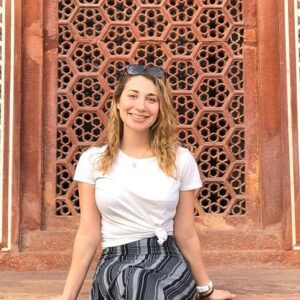 Michelle Weinfeld wrote a beautiful memoir about her grandfather’s experience surviving the Holocaust, the life lessons he imparted to her, and how being the grandchild of a Holocaust survivor has influenced her Jewish identity. Communion around food and cooking, as well as the power of food to build bridges of intergenerational memory, will be central to our discussion.
Michelle Weinfeld wrote a beautiful memoir about her grandfather’s experience surviving the Holocaust, the life lessons he imparted to her, and how being the grandchild of a Holocaust survivor has influenced her Jewish identity. Communion around food and cooking, as well as the power of food to build bridges of intergenerational memory, will be central to our discussion.
In her intergenerational memoir, Ms. Weinfeld weaves her story with that of her grandfather, Poppy. Poppy’s account of loss and rebuilding, layered with Weinfeld’s own journey to self-acceptance in the face of antisemitism, shows readers that trauma does not affect only the individual, but can transcend generations.
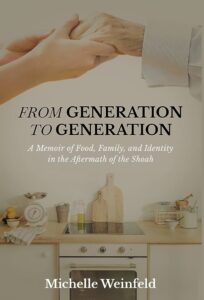 With its heartfelt anecdotes of family holidays, gripping stories of survival, and painful realizations about identity, From Generation to Generation is a universal story of overcoming adversity and not falling victim to negative experiences. Readers will find Poppy to be the grandfather figure they need, learning from his wisdom, his recipes, and his beautiful bond with his granddaughter.
With its heartfelt anecdotes of family holidays, gripping stories of survival, and painful realizations about identity, From Generation to Generation is a universal story of overcoming adversity and not falling victim to negative experiences. Readers will find Poppy to be the grandfather figure they need, learning from his wisdom, his recipes, and his beautiful bond with his granddaughter.
Copies of From Generation to Generation: A Memoir of Food, Family, and Identity in the Aftermath of the Shoah will be available for sale at the event. Ms. Weinfeld will be available to sign them.
Genocide and Diaspora: Częstochover Society and Relief Committee
Wednesday, October 25 at 6:30 PM (Hybrid: Friends Hall and Zoom)
Lea Wolinetz and Harry Rapaport return to Ramapo Campus to speak about the history of Jews in and from Częstochowa, Poland. Mr. Rapaport will share his family’s story of murder and survival, which motivated his efforts to rescue Torah scrolls hidden by the Jews of Częstochowa during the Holocaust. Ms. Wolinetz will offer a history of the diaspora of Częstochowa Jews, before and after the war. Their talk will help our students understand the lasting and global legacies of genocide with a focus on the diasporas it often creates. Our speakers represent the Częstochover Society and Relief Committee.
The Częstochover Society and Relief Committee was founded in 1914 as a Landsmannschaft (immigrant association) for Jewish immigrants from Częstochowa, Poland in New York City. Its role evolved with the times, particularly after the Holocaust and with the upward mobility and them slow passing of its founding members.
OPEN CLASSROOM SERIES: This program is part of our Open Classroom Series, through which we invite the public into our classrooms to learn from guest lecturers alongside our students. The talk will be delivered in webinar format. While we prioritize our students’ participation, non-student participants may ask questions through the Q&A feature.
This talk is free and open to the public. Light refreshments will be served.
Our Kolín Scroll: The Legacy of Czech Torahs around the World
Monday, October 30 at 12:30 PM (YMCA in Wayne)
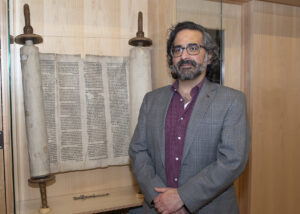 Dr. Jacob Labendz will address the weekly Lunch and Learn series at the Wayne YMCA, which offers a robust slate of Jewish programming in partnership with the Jewish Federation of Northern New Jersey.
Dr. Jacob Labendz will address the weekly Lunch and Learn series at the Wayne YMCA, which offers a robust slate of Jewish programming in partnership with the Jewish Federation of Northern New Jersey.
Dr. Labendz will display and discuss the Czech Memorial Scroll from the city of Kolín, which the Center proudly exhibits in the Special Collections Reading Room, LC-215. Dr. Labendz will share new insights on the meaning and uses of so-called “Holocaust Torahs.” For more information about our Kolín scroll, visit our designated webpage.
Jewish Genetic Genealogy: Adina Newman, Cairenn Binder, and David Gurney
Sunday, November 5 at 2:00 pm (Kol Dorot, Oradell)
In this presentation, Dr. David Gurney and Cairenn Binder of the Ramapo College of New Jersey 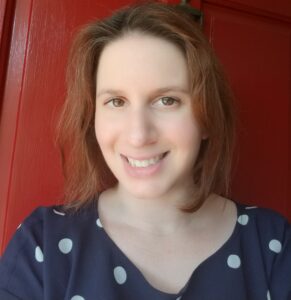 Investigative Genetic Genealogy Center will describe the impact of investigative genetic genealogy on cases of unidentified remains in New Jersey and beyond.
Investigative Genetic Genealogy Center will describe the impact of investigative genetic genealogy on cases of unidentified remains in New Jersey and beyond.
Dr. Adina Newman (My Family Genie), renowned expert in Jewish genetic genealogy, will describe the challenges of (investigative) genetic genealogy in the Jewish population. She will also share insights into Jewish genetic genealogy after the Holocaust.
Finally, the presenters will share case studies of now-solved cold cases involving unidentified decedents with Jewish ancestry.
Dr. Newman will make AncestryDNA kits available for free to survivors and their children (2G), with the submission of an application.
Rededication of Holocaust Statue, “One Man in Memory of Six Million”
Wednesday, November 8 at 4:30 PM (Friends Hall / Grove) / View our Gallery
Join us for a student-led rededication ceremony for this landmark and symbol, not only of memory but of our commitment to a future free from antisemitism, racism, and bigotries. Last year, Ramapo College’s Student Government Association passed a unanimous bill calling for better lighting and signage for our Holocaust memorial. Judith Peck’s 1973 statue, “One Man in Memory of Six Million,” was donated in 2010 by Yvonne Mannheimer Lorber in remembrance of the Mannheimer family. Center Advisory Board Member Arthur Barchenko designed and donated the lighting.
Banned Music: Solo Concert by Pianist Itay Goren in Commemoration of Kristallnacht
Thursday, November 9 at 7:00 PM (Beth Haverim Shir Shalom)
Join us to mark and memorialize the eighty-fifth anniversary of Kristallnacht (or Reichspogromnacht), a nationwide pogrom perpetrated by the Nazis and their supporters against the Jewish population of the German Reich on November 9-10, 1938.
In a return appearance at BHSS, renowned pianist and former Ramapo College faculty member Itay Goren will offer a solo piano presentation called “Banned Music.” Mr. Goren will perform and speak about the lives and works of five composers from different nationalities – Pavel Haas, Erich Korngold, Luigi Dallapiccola, Darius Milhaud and Paul Hindemith, all united by the fact that their music was banned by the Nazis.
Rabbi Ilana Schwartzman (BHSS) will introduce the evening and offer a benediction, after which Center Director will offer framing remarks.
Commemoration Kristallnacht through Music Composed in the Holocaust Ghettos and Camps
Performed and Presented by Dr. Tamara Rips Freeman
Sunday, November 12 at 7:00 PM (Temple Beth Tikvah, Wayne)
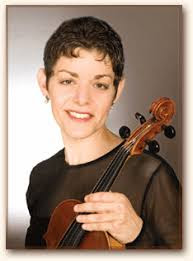 Tamara Reps Freeman, D.M.A., is the musicologist of the Association of Holocaust Organizations. She is an adjunct professor of Holocaust music, culture, and education at Yeshiva University, Cali School of Music, Montclair State University, and Saint Elizabeth University. Her dissertation is our country’s sole interdisciplinary Holocaust music education curriculum for grades Kindergarten through high school. Dr. Freeman, a concert violist, performs lecture recitals of music composed in WWII ghettos and concentration camps on her 1935 Joseph Bausch viola, which was rescued from Berlin in 1942. For more, see: www.HolocaustMusic.org.
Tamara Reps Freeman, D.M.A., is the musicologist of the Association of Holocaust Organizations. She is an adjunct professor of Holocaust music, culture, and education at Yeshiva University, Cali School of Music, Montclair State University, and Saint Elizabeth University. Her dissertation is our country’s sole interdisciplinary Holocaust music education curriculum for grades Kindergarten through high school. Dr. Freeman, a concert violist, performs lecture recitals of music composed in WWII ghettos and concentration camps on her 1935 Joseph Bausch viola, which was rescued from Berlin in 1942. For more, see: www.HolocaustMusic.org.
Light refreshments will be served.
RSVP here (livestream link available with registration).
RSVP here (livestream link available with registration).
Co-sponsored by the the Rabbi Israel S. Dresner Center for Collaborative Programs and Learning at Temple Beth Tikvah in Wayne, the Center for Holocaust and Genocide Studies at Ramapo College of New Jersey, and the Joseph Gotthelf Memorial Fund.
Responsibility to Protect
With Carl Wilkens, World Outside My Shoes
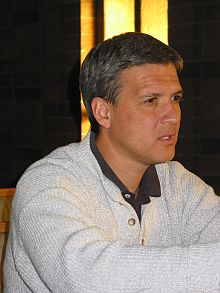 Wednesday, November 15 at 6:30 PM (Zoom only)
Wednesday, November 15 at 6:30 PM (Zoom only)
Carl Wilkens is an American Christian missionary and the former head of the Adventist Development and Relief Agency International in Rwanda. In 1994, he was the only American who chose to remain in the country after the Rwandan genocide began (Wikipedia). Mr. Wilkens established World Outside My Shoes “to equip and inspire people of all ages to build trusting relationships through restorative thinking and practices.”
Mr. Wilkens will speak to the students in Dr. Labendz’s course, “Paradigms of Genocide,” about what he witnessed and did during the Rwandan Genocide. The theme of the week will be the “Responsibility to Protect,” a principle adopted by the United Nations after the failure of the international community to intervene to stop multiple genocides in the 1990s.
OPEN CLASSROOM SERIES: This program is part of our Open Classroom Series, through which we invite the public into our classrooms to learn from guest lecturers alongside our students. The talk will be delivered in webinar format. While we prioritize our students’ participation, non-student participants may ask questions through the Q&A feature.
Transitional Justice after Genocide
With Dr. Mihaela Serban
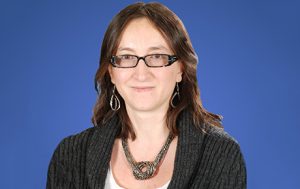 Wednesday, November 29 at 6:30 PM (Zoom only)
Wednesday, November 29 at 6:30 PM (Zoom only)
Prof. Mihaela Serban (Law and Society, Ramapo College) will speak to the students of Dr. Labendz’s course, “Paradigms of Genocide” about how societies can repair themselves and return to functionality after genocide. How can justice be achieved after such a grievous crime and what does that mean in this context? How can rifts soaked in blood be rejoined? How have perspectives on these questions developed over time? What lessons may we glean from the history of genocide and recovery?
OPEN CLASSROOM SERIES: This program is part of our Open Classroom Series, through which we invite the public into our classrooms to learn from guest lecturers alongside our students. The talk will be delivered in webinar format. While we prioritize our students’ participation, non-student participants may ask questions through the Q&A feature.
“Human Rights Law at 75: Promises and Challenges”
Panel Discussion for World Human Rights Day
Monday, December 4 at 5:00 PM in Pavilion 1
The Universal Declaration of Human Rights is 75 years old this year. How many of its original promises have been fulfilled? What kind of challenges has it encountered? Three panelists will provide an overview of human rights both globally and in the US since its signing: Jinee Lokaneeta from Drew University, Atieh Babakhani from Ramapo College, and Jean Carmalt from John Jay College. The event is moderated by Dr. Mia Serban, Ramapo College, and co-sponsored by SSHS, HGS, and the Center for Holocaust and Genocide Studies.
Moderator: Dr. Mihaela Serban
Panelists: Dr. Jinee Lokaneeta (Drew University), Dr. Atieh Babakhani (Ramapo College), and Jean Carmalt (John Jay College)
Mengele Would Say Please to Me / Mengele mi říkal prosím (2023)
Documentary Screening & Discussion with Director Martin Slunečko
Monday, January 29 at 7:00 pm at the JCC on the Palisades
This documentary film from director Martin Slunečka tells the unbelievable story of Artur Radvanský, who survived six concentration camps and, in Auschwitz, served for a few years as Mengele’s assistant. The two returned to Auschwitz, so that Radvanský could fulfill the promise he made to his friends to tell their stories. Radvanský survived to become an influential leader of the Jewish community in the Czech lands after the Holocaust.
Gaming and the Holocaust with Luc Bernard
Monday, February 12 at 7:00 pm via Zoom
This presentation will be the first in a series of five webinars exploring the theme of New Technologies, Holocaust Education, and Antisemitism.
Luc Bernard designs popular video games. His most recent creation is A Light in the Darkness, which is available for free through Epic Games. The game tells the story of a working-class family of Polish Jews in France during the Holocaust, and is considered the first video game to portray the Holocaust accurately. A Light in the Darkness promotes empathy a path to historical understanding and has been played throughout the word. Bernard has also built a model Holocaust museum, Voices of the Forgotten, in the virtual universe of the popular Fortnite platform. Since then, he has been sought after to help prominent Holocaust museum expand their reach by moving into digital space.
The Recent Ethnic Cleansing of 120,000 Artsakh Armenians from Nagorno-Karabakh
With Heghnar Watenpaugh
Wednesday, February 21 at 7:00 pm via Zoom
In October 2023, clashes with the Azerbaijan army led to the ethnic cleansing of some 120,000 ethnic Armenians from the contested region of Nagorno-Karabakh. Media coverage has been sparse, matching the response from the international community. Dr. Heghnar Watenpaugh will address this current crisis and place it in historical perspective.
Edwin Black, Artificial Intelligence (AI) and Antisemitism
Wednesday, March 6 at 7:00 pm via Zoom
This presentation will be the second in a series of five webinars exploring the theme of New Technologies, Holocaust Education, and Antisemitism.
Artificial Intelligence holds many untold promises for humanity. This lack of certainty has the potential both to excite and terrify. Edwin Black, noted historian and public speaker, will lead us in a discussion of AI’s potential to affect the spread and mitigation of antisemitism.
Countering AI Antisemitism in Theory and Practice
Sunday, March 10 at 11:00 am via Zoom
This presentation will be the third in a series of five webinars exploring the theme of New Technologies, Holocaust Education, and Antisemitism.
As a follow up to our discussion with Edwin Black, we will host Dr. Ildikó Barna (Eötvös Loránd University, Budapest) and Tal-Or Cohen Montemayor (CEO of Cyberwell, Israel) for a discussion of how to identify and combat antisemitism in a world increasingly influenced by Artificial Intelligence.
“What do Russians Think about the War in Ukraine?”
With Arsenii Pogosian
Monday, March 25 at 2:15 pm SC-156 and via Zoom
A discussion about unjust wars and difficult choices, moderated by Professor Mia Serban. Co-sponsored by the Law and Society Speaker Series, SSHS, Phi Alpha Delta, and the Center.
A discussion about unjust wars and difficult choices, moderated by Professor Mia Serban. Co-sponsored by the Law and Society Speaker Series, SSHS, Phi Alpha Delta, and the Center.
Subcontractors of Guilt: Holocaust Memory & Muslim Belonging in Postwar Germany
With Esra Ösyürek
Tuesday, March 26 at 7:00 pm at Ramapo College, ASB 136 and via Zoom
We recommend attending in person and are offering a Zoom option for those who cannot.
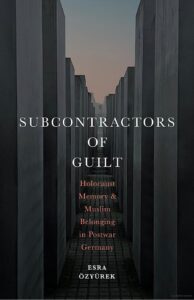 The Center and the MA program in Holocaust & Genocide Studies at Stockton University are cosponsoring a four-stop (three state) lecture tour for Professor Esra Ösyürek of the University of Cambridge. She will discuss her latest book, Subcontractors of Guilt: Holocaust Memory & Muslim Belonging in Postwar Germany (Stanford University Press, 2023). The study explores when, how, and why Muslim Germans have moved to the center of Holocaust memory discussions. Esra Özyürek argues that German society “subcontracts” guilt of the Holocaust to new minority immigrant arrivals, with the false promise of this process leading to inclusion into the German social contract and equality with other members of postwar German society.
The Center and the MA program in Holocaust & Genocide Studies at Stockton University are cosponsoring a four-stop (three state) lecture tour for Professor Esra Ösyürek of the University of Cambridge. She will discuss her latest book, Subcontractors of Guilt: Holocaust Memory & Muslim Belonging in Postwar Germany (Stanford University Press, 2023). The study explores when, how, and why Muslim Germans have moved to the center of Holocaust memory discussions. Esra Özyürek argues that German society “subcontracts” guilt of the Holocaust to new minority immigrant arrivals, with the false promise of this process leading to inclusion into the German social contract and equality with other members of postwar German society.
Panel Discussion: “Whose Story is it to Tell?”
Tuesday, April 2 at 7:00 pm via Zoom
The sad but inevitable passing of the survivor generation, in the immediate future, has raised a number of anxious questions for educators and the Jewish community. Who will tell—indeed, who may tell—the story of the Holocaust in the absence of witnesses and survivors? The Center is convening a panel of authors and memory activists to provide perspective on this question and the future of memory work and representation.
The sad but inevitable passing of the survivor generation, in the immediate future, has raised a number of anxious questions for educators and the Jewish community. Who will tell—indeed, who may tell—the story of the Holocaust in the absence of witnesses and survivors? The Center is convening a panel of authors and memory activists to provide perspective on this question and the future of memory work and representation.
The Panel
Dr. Jessica Carr, Assoc. Professor of Religious Studies at Lafayette College
Dr. Meryl Ain, Author, Novelist, and Educator
Aaron Ginns, Education & Outreach Director, 3GNY (Third Generation New York)
Moderated by Dr. Jacob Ari Labendz, Director of the Center
Panel Discussion: “Resistance or Resilience? Religious Belief and Practice in the Face of Oppression”
Thursday, April 4 at 6:30 pm via Zoom
As a sense of urgency and crisis pervades national and global politics, many worry for our shared future. This includes communities that have faced and continue to struggle against oppression. In this program, we turn to leaders from such communities for guiding wisdom and perspective. Our panel places into active discussion scholars and clergy from different ethno-religious traditions, as we explore the role of faith and religious practice among and within communities subjected to historical and ongoing oppression.
We ask: What, if anything, distinguishes resistance from resilience? How have theologians and practitioners adapted their traditions to the conditions of oppression, and what have been the consequences of such changes? What wisdom survives to inform the future, when oppression abates or changes in nature? Can practitioners make their wisdom and experiences intelligible to outsiders, including our former oppressors, without adopting the majority’s frameworks of historical and religious perception? What is lost if we do not meet this challenge? Are their universal lessons to be found in our particularity?
Featuring:
Dr. Ryan McLaughlin, Chair of Theology at St. Elizabeth University
Rev. Craig Dunn, Sr. Pastor of the First Baptist Church in Madison
Dr. Jacob Labendz, Center Director
Moderated by Dr. Richard Quinlan, St. Elizabeth University
Cosponsored with Center for Holocaust and Genocide Education at St. Elizabeth University.
Accenture: Artificial Intelligence as a Tool for Holocaust Research
Tuesday, April 9 at 7:00 via Zoom
This presentation will be the fourth in a series of five webinars exploring the theme of New Technologies, Holocaust Education, and Antisemitism.
This presentation will be the fourth in a series of five webinars exploring the theme of New Technologies, Holocaust Education, and Antisemitism.
The Arolsen Archives preserve the world’s largest collection of documents on Nazi persecution — 110 million documents and digital objects, a portion of which are part of UNESCO’s Memory of the World program — to keep the memory of the crimes of the German terror regime alive. An essential part of the Archives’ work is to make these documents accessible to all who wish to search for traces of Holocaust victims and survivors, persecution of minorities and forced labor. Every document maintained in the archives needs to be reviewed and its information (e.g., the family name and birth date on a prisoner registration form) put into a database.
To facilitate this process, the Arolsen Archives established “#everynamecounts,” a crowdsourcing project for volunteers to extract information from documents manually. Ian Lever, an Accenture volunteer and a member of the company’s Jewish Employee Resource Group, quickly realized that AI could accelerate this process significantly. Within 10 weeks, he and other Accenture volunteers set up an AI solution to index the documents. Because the AI captures the information faster and increases its accuracy, four volunteers can now validate approximately 160 documents in one hour, a 40-fold increase in productivity.
30th Remembrance of the 1994 Genocide of Tutsis in Rwanda
Wednesday, April 17 at 1:00, Friends Hall
It has been thirty years since the world witnessed the genocide of 800,000 Tutsis at the hands of Hutu extremists and their followers in Rwanda, who also killed moderate Hutus. The Center has scheduled a series of events for students and the public throughout the day. The highpoint will be a moderated discussion with survivors Providence Umugwaneza and Erick Nkurunziza. (Ms. Umugwaneza is the author of a moving memoir, Next Couple of Hours.) The NJ Commission for Holocaust Education has provided generous support for this program.
It has been thirty years since the world witnessed the genocide of 800,000 Tutsis at the hands of Hutu extremists and their followers in Rwanda, who also killed moderate Hutus. The Center has scheduled a series of events for students and the public throughout the day. The highpoint will be a moderated discussion with survivors Providence Umugwaneza and Erick Nkurunziza. (Ms. Umugwaneza is the author of a moving memoir, Next Couple of Hours.) The NJ Commission for Holocaust Education has provided generous support for this program.
The program will include the premier of a digital exhibit produced by the students in Dr. Jacob Ari Labendz’s Fall 2023 course, “Paradigms of Genocide.”
The X-Men and the Holocaust: Representations of Memory, Jewish Identity, and Otherness
With Dr. Christin Zühlke
Monday, April 29 from 1:00 – 2:00 pm, SC-158 or Zoom
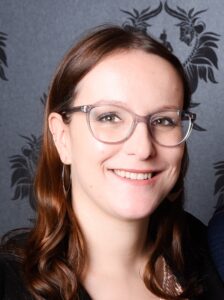 Since the 1960s, the X-Men, a group of superhero mutants with mental or physical superpowers, have been fighting evil. Because of their mutation, the X-Men are also a visualized metaphor for the others in the US, including Jews. In her lecture, Dr. Christin Zühlke will discuss evolving representations of Holocaust memory, (Jewish) identity, and otherness in America through the lens of the X-Men comic characters Magneto and Kitty Pryde. By juxtaposing these two characters, she intends to analyze various facets of gender, intergenerational discourses, and the moral implications of survival and trauma.
Since the 1960s, the X-Men, a group of superhero mutants with mental or physical superpowers, have been fighting evil. Because of their mutation, the X-Men are also a visualized metaphor for the others in the US, including Jews. In her lecture, Dr. Christin Zühlke will discuss evolving representations of Holocaust memory, (Jewish) identity, and otherness in America through the lens of the X-Men comic characters Magneto and Kitty Pryde. By juxtaposing these two characters, she intends to analyze various facets of gender, intergenerational discourses, and the moral implications of survival and trauma.
Part of our “Open Classroom Series,” which (virtually) opens Ramapo College classrooms to the public for special talks and guest lectures. We thank Dr. Ed Shannon and the students of LITR 295: “Popular Topics on Literature: The Marvel Universe.”
Co-Sponsored by AFT Local 2274 as part of its “Academic Freedom” series.
“Why Prevention Fails: Chronicling the Genocide in Artsakh”
Annual Lecture in Remembrance of the Armenian Genocide
With Dr. Elisa von Jorden-Forgey (Lemkin Institute for Genocide Prevention)
Wednesday, May 1 at 7:30 pm via Zoom
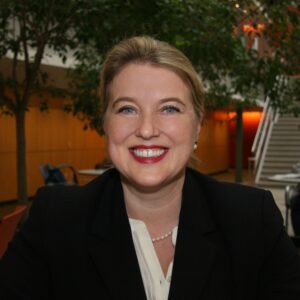 In September 2023, the Azerbaijani military initiated a large-scale invasion of the autonomous Artsakh Republic (Nagorno-Karabakh), home to an historic Armenian community, after having besieged and attacked the disputed territory over the previous ten months. Following an official ceasefire, Azerbaijan ordered the dissolution of all state institutions by the following year. This culminated in the flight and ethnic cleansing of ethnic Armenians from Artsakh. Dr. von Jorden-Forgey will discuss how the Lemkin Institute “does [genocide] prevention” and why all prevention mechanisms failed last fall. Her talk will include suggestions for stronger prevention mechanisms going forward.
In September 2023, the Azerbaijani military initiated a large-scale invasion of the autonomous Artsakh Republic (Nagorno-Karabakh), home to an historic Armenian community, after having besieged and attacked the disputed territory over the previous ten months. Following an official ceasefire, Azerbaijan ordered the dissolution of all state institutions by the following year. This culminated in the flight and ethnic cleansing of ethnic Armenians from Artsakh. Dr. von Jorden-Forgey will discuss how the Lemkin Institute “does [genocide] prevention” and why all prevention mechanisms failed last fall. Her talk will include suggestions for stronger prevention mechanisms going forward.
Elisa von Joeden-Forgey is Executive Director of the Lemkin Institute for Genocide Prevention. She was formerly the Endowed Chair in Holocaust and Genocide Studies at Keene State College and director of the Master’s Program in Genocide Prevention and Human Security. Before this, she was the Dr. Marsha Raticoff Grossman Associate Professor of Holocaust and Genocide Studies at Stockton University in New Jersey, where she also directed the master’s program in Holocaust and Genocide Studies and founded the world’s first academic, graduate-level Genocide Prevention Certificate Program. She is former President of Genocide Watch, former First Vice President of the International Association of Genocide Scholars, and co-founder of the Lemkin Institute for Genocide Prevention. She received her MA and PhD in History from the University of Pennsylvania and her BA from Columbia University.
Cosponsors
Armenian National Committee of NJ
Lemkin Institute for Genocide Prevention
Ramapo College Observes of Yom HaShoah, Monday, May 6
Campus Pronouncement
1:15 – 1:45 pm at the Arch, Ramapo Campus
Holocaust Testimony Presentation, BHSS Religious School
7:00 – 8:00 pm in Friends Hall, Ramapo Campus
Come learn from the next generation! The religious school of Temple Beth Haverim Shir Shalom in Mahwah has been working all year with the Center at Ramapo College to produce an online exhibit about the lives of Holocaust survivors who settled in our region. Join us for a student presentation to learn and support these incredible 7th and 8th graders. The project is based upon the StoryMaps presentations produced by the students of Dr. Jacob Labendz’s Fall 2022 course on the history of the Holocaust.
Pizza will be served.
Virtually Modeling the Janowska Concentration Camp
With Waitman Wade Beorn
Tuesday, May 7 at 7:00 pm via Zoom
This presentation will be the fifth in a series of five webinars exploring the theme of New Technologies, Holocaust Education, and Antisemitism.
The Nazis established the Janowska Concentration Camp on the outskirts of occupied Lviv (currently in Ukraine, also called Lvov and Lemberk). They enslaved and murdered no fewer than 80,000 Jews on that site. Like other camps, much of the former site remains inaccessible or was destroyed by the Nazis during the war to cover their crimes. Dr. Waitman Wade Beorn, an historian of the Second World War, has endeavored to create a virtual model of the camp for research and teaching, based upon archival and photographic evidence, as well as survivor testimonies.
Yom HaShoah: Anna Scheumann Speaks as the Granddaughter of Survivors
Thursday, May 16 at 5:00 pm at the River Edge Public Library
Anna Scheumann’s grandparents survived the Holocaust. She has taken upon herself the responsibility to tell their stories and her own. Ms. Scheumann speaks frequently to various audiences and serves on the board of 3GNY, a regional organization that prepares the grandchildren of Holocaust survivors (third-generation survivors) to keep the memories of their ancestors and the Shoah alive.
The Center is honored to support the River Edge Public Library and the River Edge Cultural Center with this program in commemoration of Yom HaShoah, the day set aside by Jewish communities for the remembrance of the Holocaust and its victims, and to honor its survivors and heroes.
Copyright ©2025 Ramapo College Of New Jersey. Statements And Policies. Contact Webmaster.
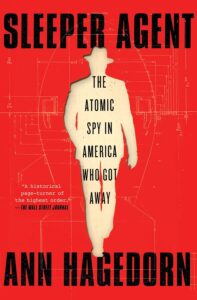
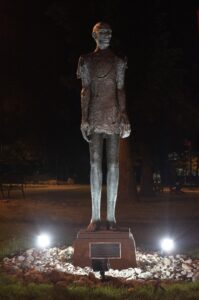
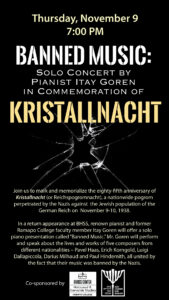
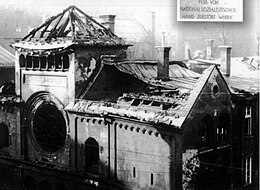
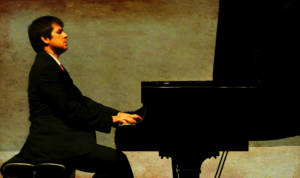

Follow Us!